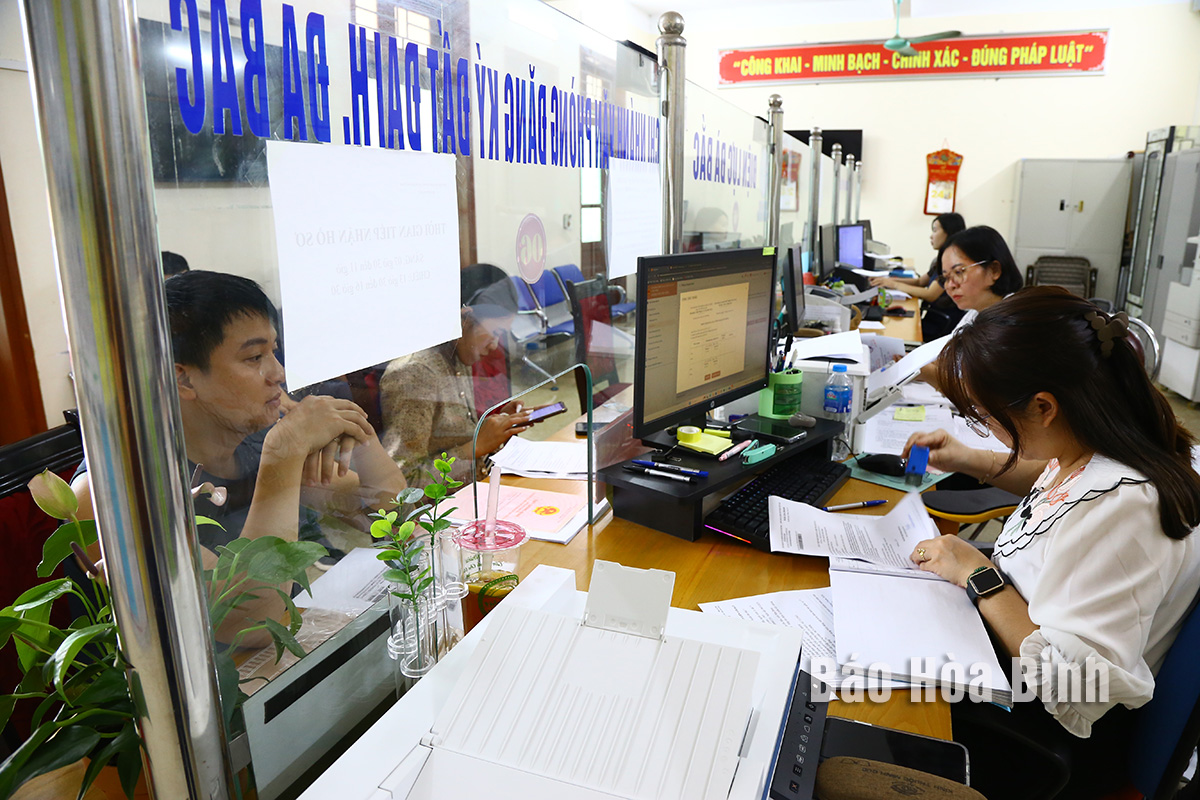
As a mountainous district still facing numerous challenges, Da Bac has made notable progress in advancing administrative reforms across various areas. The district has prioritised reorganising and streamlining its administrative apparatus, operating "one-stop-shop” units, and applying information technology (IT) in the handling of administrative procedures. Efforts have also been directed toward upgrading infrastructure and equipment to enhance service quality for residents and businesses.
The one-stop-shop division responsible for receiving and returning administrative procedure requests in Da Bac district has created favourable conditions for individuals and businesses seeking to complete administrative tasks.
Sa Thi Ngan, a resident of Da Bac township, shared her satisfaction after visiting the "one-stop-shop” unit to complete procedures for transferring land use rights. She praised the thorough guidance provided by the staff and the clear timelines for receiving results, which adhered to State regulations.
Luong Van Thi, Chairman of Da Bac district People’s Committee and head of the District Steering Committee for Administrative Reform, noted that since the beginning of the year, the district has issued directives on key administrative reform tasks. Administrative procedures, as well as channels for receiving feedback and complaints from individuals and organisations, have been made public on the district’s e-portal. Dossiers and outcomes are digitised in compliance with regulations.
Currently, all communes in the district have established modern "one-stop-shop” units to handle administrative procedures for residents and organisations. The application of IT in management, operations, and public services has contributed to administrative modernization and the development of a digital government in the locality.
As of now, all administrative procedure dossiers are processed online. In the first nine months of this year, a total of 13,438 applications for administrative procedures were received, including 536 at the district level and 12,902 at the commune level. The majority of these applications were resolved on time.
Despite these achievements, the district still faces challenges. The review and simplification of administrative procedures yielded limited results, and some agencies and units have not yet met established goals and standards. Additionally, the use of IT in management and operations has not been fully optimised.
To address these issues, the district plans to implement several solutions. According to Chairman Thi, communication efforts will be intensified to raise public awareness about the importance and impact of administrative reforms. Regular reviews and evaluations of administrative procedures will be conducted to propose timely updates and amendments. Greater emphasis will also be placed on IT applications to improve efficiency in handling administrative tasks and streamlining operations across agencies.
Furthermore, the district will strengthen oversight and monitoring to promptly address shortcomings, while recognizing and rewarding individuals and collectives for outstanding performance. Maintaining and improving the quality of "one-stop-shop” units at both district and commune levels will remain a top priority. Investments will continue in upgrading equipment to meet the standards set by the provincial Department of Information and Communications and align with the province’s roadmap for modernising administrative services.
Finally, the district will enhance inspections of public service activities and administrative reforms, with a focus on resolving bottlenecks and strictly addressing any negative behaviors or misconduct in the handling of administrative procedures.
The Standing Board of the Hoa Binh provincial Party Committee has agreed in principle on a proposal by the Standing Board of the Party Committee of Hoa Binh city to gather feedback on the city’s 1:2000 zoning plan, which forms part of its broader urban development strategy.
Hoa Binh province has made notable progress in public administration reform and digital government development, with the satisfaction index among citizens and businesses reaching over 84%, according to recent government evaluations.
Thanks to great efforts by local authorities in recent times, the governance and public administration performance of Mai Chau district has been significantly improved.
In the afternoon of June 6, the Party Committee, the People's Council, the People's Committee and the Fatherland Front of Lac Son district solemnly held a meeting to celebrate the 139th anniversary of the district's founding (1886–2025) and the 79th anniversary of the establishment of the district's Party Committee (1946–2025). There was the attendance of Mr. Bui Van Thang, the Vice Chairman of the Provincial People's Council; Mr. Quach Tat Liem, the Vice Chairman of the Provincial People's Committee; Ms. Dang Bich Ngoc, the Deputy Head of the National Assembly Delegation of the province; as well as the former leaders of the province and district through various periods, who are the natives of the district.
Implementing the Politburo’s Resolution No. 57-NQ/TW on breakthroughs in science – technology, innovation, and digital transformation is a golden opportunity for the northern mountainous province of Hoa Binh to renew growth model, improve competitive edge and shorten digital gap.
Resolution 57-NQ/TW, issued by the Politburo on December 22, 2024, identifies sci-tech, innovation, and digital transformation as strategic breakthroughs to build a developed and prosperous nation. In Hoa Binh province, this spirit is not just a slogan, it’s being put into action through concrete initiatives that form a "new development triangle”: digital citizenship, digital economy, and digital administration.



